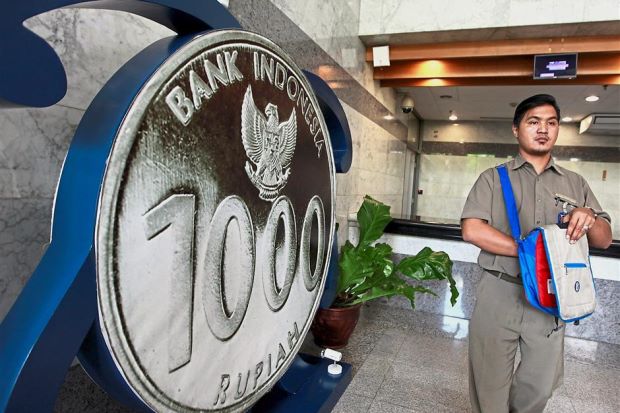Indonesia: Politics may affect rupiah
JAKARTA: Indonesia’s rupiah may reverse gains that made it emerging Asia’s top performer in 2016 as some of the currency’s key supports risk turning into Achilles heels.
President Joko Widodo’s economic reforms have underpinned the rupiah’s advance as have the highest Asian bond yields after Pakistan, which make its debt a favourite among foreign investors. This year, politics could become a drag, with the Widodo-backed governor of Jakarta under fire from Islamic groups before next month’s city election run-off, while US tightening risks reducing that much-loved yield advantage. And then there’s Donald Trump.
Up 1.1% to 13,325 per US dollar this year, the rupiah may slump 1.7% by the end of June, the median of analysts’ estimates compiled by Bloomberg shows.
“The main risk to the rupiah is from the large foreign bondholding amid rising US rates and overweight positioning by real-money investors,” said Dushyant Padmanabhan, a currency strategist at Nomura Holdings Inc in Singapore, who sees the currency falling 2% by June 30. “It’s also susceptible to broader risk aversion from protectionist US policy, geopolitical risks or a turn in sentiment.”
Speculation that Indonesia is next in line for a credit-rating upgrade has also buoyed the rupiah and Indonesian assets, with more than US$4bil flowing into the country’s bonds and stocks this year.
But that investment could be a double-edged sword, with foreign ownership of Indonesian sovereign bonds now at 38%, the highest in the region. That raises the prospect of large capital outflows and an uptick in volatility should the Federal Reserve tread a more hawkish-than-expected path on monetary policy.
Bank Indonesia has reduced its intervention in the rupiah as the market mechanism is functioning actively and effectively, Nanang Hendarsah, head of financial market development department, said yesterday. Policy makers are committed to upholding the foreign-exchange market mechanism, while the ensuring rupiah is stable and in line with fundamentals, Hendarsah said.
For Barclays Plc, the Jakarta vote is key, with the election likely setting the scene for the next presidential poll, says Mitul Kotecha, head of Asia currency and rates strategy in Singapore.
Widodo’s pick, incumbent Basuki Tjahaja Purnama, is up against former education minister Anies Baswedan in the April 19 runoff, after the first round of voting in February failed to produce an outright winner.
“Persistent current-account deficits amid rising imports, potential political tensions ahead of the Jakarta gubernatorial runoff and a stronger dollar” are the rupiah’s key challenges this half, said Saktiandi Supaat, head of currency research at Malayan Banking Bhd in Singapore.
He expects it to weaken to 13,600 per dollar by the end of June.
For Capital Economics Ltd, it’s mostly about Trump. Oliver Jones, the London-based company’s assistant economist, sees the rupiah sliding 4.8% from current levels by the end of 2017.
“Although, unlike China and Mexico, Indonesia hasn’t specifically been the target of President Trump’s protectionist rhetoric, if the US were to adopt blanket tariffs or the proposed border adjustment tax, the rupiah would be vulnerable,” Jones said, adding they expect the Fed to raise rates more quickly than the market is anticipating.
But a Trump trade war is still a big what if, and the rupiah has some heavy-hitting fans. BlackRock Inc, the world’s biggest money manager, is long the rupiah and Goldman Sachs Group Inc called Indonesia a good carry-trade market this month.
After cutting interest rates six times last year, Bank Indonesia also appears to have shifted to a more neutral stance. Key borrowing costs are “low enough” and the rupiah is slightly undervalued, according to senior deputy governor Mirza Adityaswara.
“Overall, we are actually quite constructive on the rupiah,” said Kotecha at Barclays, which sees it falling to 13,700 by the end of the second quarter.
“The reason we see weakness against the dollar is more a dollar story. From the rupiah’s perspective, we continue to favour it for long-term leg carry.” – Bloomberg
Source: http://www.thestar.com.my/business/business-news/2017/03/31/politics-may-affect-rupiah/#tPCAYbHL8AHvQS02.99


 Thailand
Thailand




